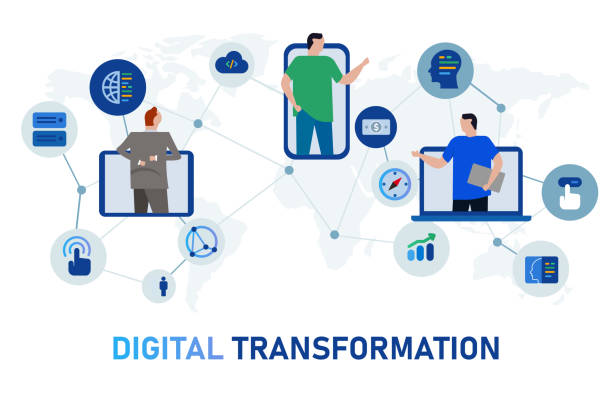In today’s fast-paced and technology-driven world, organizations are undergoing digital transformation to stay competitive and adapt to the changing business landscape. Digital Transformation refers to the integration of digital technologies into all aspects of an organization, fundamentally changing how it operates and delivers value to customers.
However, for digital transformation to be successful, organizations must invest in training programs that equip their workforce with the necessary skills and knowledge.
This article explores five essential training programs that organizations should implement to prepare their workforce for the challenges of digital transformation, focusing on cybersecurity, data analytics, cloud computing, artificial intelligence, and agile methodologies.
Contents
- 1 Understanding Digital Transformation
- 1.1 Essential Workforce Training Programs for Digital Transformation
- 1.1.1 1. Digital Literacy and Awareness
- 1.1.2 2. Data Literacy and Analytics
- 1.1.3 3. Agile Methodologies and Collaboration
- 1.1.4 4. Customer-Centricity and User Experience
- 1.1.5 5. Change Management and Adaptability
- 1.1.6 6. Cybersecurity Training
- 1.1.7 7. Cloud Computing Training
- 1.1.8 8. Artificial Intelligence (AI) Training
- 1.1 Essential Workforce Training Programs for Digital Transformation
- 2 Key Take-Aways
Understanding Digital Transformation
Digital transformation encompasses the adoption and integration of digital technologies, such as cloud computing, artificial intelligence, big data analytics, the Internet of Things (IoT), and automation, to enhance operational efficiency, improve customer experiences, and drive innovation.
It goes beyond simply digitizing existing processes and requires organizations to reimagine their business models, strategies, and organizational culture to fully leverage the power of digital technologies.
Essential Workforce Training Programs for Digital Transformation
1. Digital Literacy and Awareness
Digital literacy training programs are crucial to ensure that employees have a foundational understanding of digital technologies, their benefits, and the implications for the organization. This training should cover topics such as basic computer skills, internet usage, digital communication tools, and cybersecurity awareness.
By fostering digital literacy and awareness, organizations can create a workforce that is comfortable and confident in navigating the digital landscape.
2. Data Literacy and Analytics
In recent times, data has become a strategic asset for organizations. This has only made it more urgent for organizations to empower their staff with data literacy training programs. Data analytics training equips employees with the skills to collect, analyze, and interpret data effectively.
Training should cover data analysis techniques, data visualization tools, and the interpretation of key performance indicators. Empowering employees with data analytics skills can help organizations leverage data to identify trends, optimize processes, enhance customer experiences, and drive innovation.
3. Agile Methodologies and Collaboration
Digital transformation requires organizations to adopt agile methodologies to respond to rapidly changing market dynamics. Agile methodologies, such as Scrum or Kanban, are instrumental in enabling organizations to adapt quickly to change and deliver value iteratively.
Moreover, training should emphasize adaptability, continuous improvement, and customer-centricity. By embracing agile methodologies, organizations can foster innovation, streamline project management, and deliver value in shorter cycles, enabling them to stay ahead in the digital landscape.
4. Customer-Centricity and User Experience
Digital transformation places a strong emphasis on customer-centricity and delivering exceptional user experiences. Training programs should instill a deep understanding of customer needs, journey mapping, user experience design principles, and customer feedback analysis. By nurturing a customer-centric mindset, organizations can create innovative products, services, and digital experiences that resonate with their target audience.
5. Change Management and Adaptability
Digital transformation often brings significant changes to processes, roles, and organizational structures. Change management training equips employees with the skills to embrace change, navigate uncertainty, and become resilient in the face of transformation. Training programs should cover change management methodologies, effective communication, and strategies for overcoming resistance. By developing change management and adaptability skills, organizations can create a workforce that embraces and drives digital transformation initiatives.
6. Cybersecurity Training
As organizations embrace digital technologies, they also face increased cybersecurity risks. Cyber threats are ever-evolving, and a single breach can have significant consequences. Therefore, cybersecurity training is crucial to educate employees on best practices for data protection, threat detection, incident response, and compliance with security protocols. Training programs should cover topics such as password management, phishing awareness, secure communication, and data privacy, ensuring that employees understand their role in safeguarding digital assets and mitigating risks.
7. Cloud Computing Training
Cloud computing has revolutionized the way organizations store, manage, and access data. Training programs on cloud computing educate employees on the fundamentals of cloud infrastructure, platform-as-a-service (PaaS), software-as-a-service (SaaS), and data migration to the cloud. Additionally, employees should learn about cloud security, cost optimization, scalability, and collaborative tools. Cloud computing training enables organizations to leverage the flexibility, scalability, and cost-efficiency of cloud platforms to support their digital transformation initiatives.
8. Artificial Intelligence (AI) Training
AI technologies have immense potential to transform business processes and drive innovation. Organizations should invest in AI training programs to familiarize employees with AI concepts, algorithms, and applications. Topics covered may include machine learning, natural language processing, computer vision, and robotic process automation. AI training empowers employees to identify AI opportunities, develop AI-powered solutions, and embrace automation to enhance productivity, customer experiences, and competitive advantage.
Also Read: How Digital Adoption has Transformed the Healthcare Sector
Key Take-Aways
Digital transformation is a complex and multifaceted journey that demands a skilled and adaptable workforce. By implementing essential training programs, organizations can ensure that their employees are well-prepared for the challenges and opportunities that come with digital transformation. Cybersecurity, data analytics, cloud computing, artificial intelligence, and agile methodologies are key areas where organizations should focus their training efforts. Equipping employees with these skills will enable them to navigate the digital landscape with confidence, drive innovation, and contribute to the success of the organization’s digital transformation initiatives.
In order to be ready for the inevitable digital transformation, it’s crucial to have the essential skills. Indepth Research Institute (IRES) would build your capacity to be at the forefront of this transformation. Register and be the best version of yourself.
[wpforms id=”1678″]
We have a firm belief that every organization has a unique purpose only they can fulfil in this world. We work with you in organizing your resources to exploit opportunities so that you can fulfil your purpose and realize full potential. We build the capacity of people, processes and systems for organizational success and growth as well as nurturing a thriving ecosystem.
Ready to enhance your skills and boost your career? Explore our corporate training programs now and start your journey to success.








Comment here